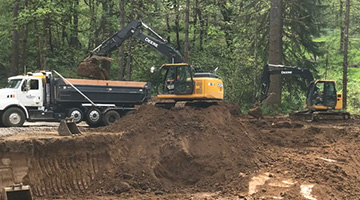Comprehensive Excavation Approaches: Mastering the Principles for Success
In the realm of building and construction and civil engineering, the value of effective excavation methods can not be overemphasized. The careful planning, exact implementation, and precise interest to information needed in excavation projects demand a thorough technique that includes numerous basic facets. From initial soil evaluation to the application of safety measures and regular progression monitoring, understanding these core components is vital for attaining success in any excavation venture. The real mastery lies not merely in recognizing these principles however in flawlessly incorporating them to browse the intricacies of excavation jobs with finesse.
Recognizing Excavation Job Planning

The first phase of any kind of excavation job is the preparation stage, where vital choices are made that can significantly affect the end result of the task. Recognizing the task spending plan, timeline, and extent restraints is crucial for creating a detailed excavation strategy that makes sure the job's success.
One key facet of excavation project planning is the growth of an in-depth timeline that details the sequence of tasks, milestones, and deadlines. By meticulously thinking about all these elements during the planning phase, excavation projects can be executed efficiently and effectively, leading to successful outcomes - lancaster trenching.
Dirt Analysis and Website Analysis
Conducting complete dirt analysis and site assessment is a vital action in the prep work stage of any kind of excavation project. Soil evaluation includes establishing the structure, structure, and residential properties of the soil at the excavation site. This information is vital for comprehending the dirt's bearing ability, wetness web content, and possibility for erosion, which are essential factors in determining the excavation techniques and equipment needed for the project.
Website evaluation surpasses dirt evaluation and encompasses a more comprehensive analysis of the total website problems. This analysis includes determining any kind of potential hazards, such as underground utilities, environmental concerns, or unstable surface, that can influence the excavation procedure. By completely examining the site, task supervisors can develop effective excavation strategies that prioritize safety, effectiveness, and environmental management.
Making use of sophisticated innovations like ground-penetrating radar, soil tasting, and drone surveys can enhance the precision and performance of soil analysis and website examination. Investing time and resources in these initial steps can inevitably conserve time and avoid pricey hold-ups or problems throughout the excavation procedure.
Equipment Option and Use
Efficient excavation tasks depend heavily on critical devices choice and application to make sure optimal performance and performance. Choosing the appropriate devices for the task is essential in making the most of efficiency and lessening downtime. Factors such as the kind of soil, deepness of excavation, and task range play a significant role in establishing one of the most ideal equipment for the task available.

Along with selecting the appropriate devices, proper usage is vital to project success. Operators should be trained to deal with the equipment safely and efficiently - dump truck companies in ohio. Normal upkeep checks and timely repair services assist stop malfunctions and guarantee consistent performance throughout the task
Safety And Security Actions and Rules Conformity
In the realm of excavation projects, focusing on safety and security procedures and compliance with regulations is paramount to making certain a legally audio and safe operational setting. Precaution encompass an array of methods, including conducting thorough website assessments, implementing appropriate signage and obstacles, and offering sufficient safety training for all personnel associated with the excavation process. Adherence to guidelines, such as OSHA requirements in the USA, makes certain that the excavation task satisfies the required criteria to shield employees, bystanders, and the surrounding setting.
Surveillance Development and Adjusting Methods
How can predict managers properly track the development of excavation tasks and adapt their approaches accordingly to maximize results? Monitoring development is crucial for guaranteeing that excavation tasks remain on track and meet due dates.

Conclusion
To conclude, understanding the basics of extensive excavation strategies is essential for the success of any kind of job. By understanding task planning, analyzing dirt and site problems, choosing appropriate devices, following safety and security guidelines, and keeping track of progression, job supervisors can guarantee a reliable and smooth excavation process. Implementing these methods will bring about successful end results and decrease potential threats or problems throughout the excavation project.
The preliminary stage of any excavation job is the preparation stage, where important choices are made that can significantly affect the end result of the project. Comprehending the task timeline, range, and spending plan restrictions is crucial for creating a detailed excavation strategy that ensures the project's success.
Exactly how can predict supervisors effectively track the development of excavation jobs and adjust their approaches accordingly to optimize outcomes? Resources By carefully keeping an eye on progression and being eager to adapt techniques, job managers can improve the general success of excavation jobs.
By recognizing task preparation, assessing soil and site problems, choosing appropriate tools, abiding with safety and security regulations, and monitoring progress, job supervisors can make sure a Get the facts effective and smooth excavation procedure.